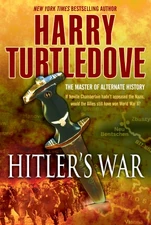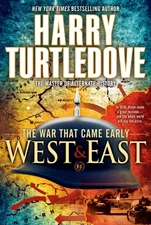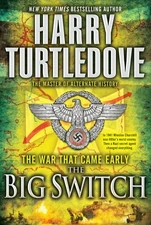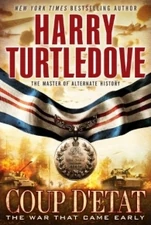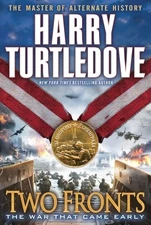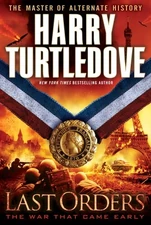ML4E (Message Wall | contribs) mNo edit summary |
No edit summary |
||
| Line 8: | Line 8: | ||
|type of appearance = Direct (HW) POV (W&E on)}}'''Theodosius "Theo" Hossbach''' was [[Germany (The War That Came Early)|German]] [[Panzer II (The War That Came Early)|Panzer II]] radio operator during [[World War II (The War That Came Early)|the Second World War]]. His passion for the radio was such that he had the uncanny ability to tune out the real world even while in the heat of battle. This "talent" sometimes led Hossbach to share his political opinions at inappropriate times. His father had been reading ''The Decline and Fall of the Roman Empire'' when Hossbach was born, hence his very Latin sounding first name. |
|type of appearance = Direct (HW) POV (W&E on)}}'''Theodosius "Theo" Hossbach''' was [[Germany (The War That Came Early)|German]] [[Panzer II (The War That Came Early)|Panzer II]] radio operator during [[World War II (The War That Came Early)|the Second World War]]. His passion for the radio was such that he had the uncanny ability to tune out the real world even while in the heat of battle. This "talent" sometimes led Hossbach to share his political opinions at inappropriate times. His father had been reading ''The Decline and Fall of the Roman Empire'' when Hossbach was born, hence his very Latin sounding first name. |
||
| + | ==Hitler's War== |
||
Under the command of [[Ludwig Rothe]], Hossbach was part of [[Case Green#Case Green in The War That Came Early|the invasion]] of [[Czechoslovakia (The War That Came Early)|Czechoslovakia]]. His crew also included driver [[Fritz Bittenfeld]]. Unlike his colleagues, Hossbach did not worry much about the rather fragile state of the Panzer II, so long as his radio worked. The invasion was successful, and Czechoslovakia was subdued in about a month. Hossbach and his crew were then transferred to west, where they participated in the invasion of the [[Netherlands (The War That Came Early)|Netherlands]], which fell in a week. Hossbach and his crew then pressed on into [[Belgium (The War That Came Early)|Belgium]]. Throughout these battles, Rothe did his best to keep Hossbach tuned in to what was going on around them as much as possible, with varying degrees of success. |
Under the command of [[Ludwig Rothe]], Hossbach was part of [[Case Green#Case Green in The War That Came Early|the invasion]] of [[Czechoslovakia (The War That Came Early)|Czechoslovakia]]. His crew also included driver [[Fritz Bittenfeld]]. Unlike his colleagues, Hossbach did not worry much about the rather fragile state of the Panzer II, so long as his radio worked. The invasion was successful, and Czechoslovakia was subdued in about a month. Hossbach and his crew were then transferred to west, where they participated in the invasion of the [[Netherlands (The War That Came Early)|Netherlands]], which fell in a week. Hossbach and his crew then pressed on into [[Belgium (The War That Came Early)|Belgium]]. Throughout these battles, Rothe did his best to keep Hossbach tuned in to what was going on around them as much as possible, with varying degrees of success. |
||
| Line 16: | Line 17: | ||
Not much later, Hossbach and his crew were part of the invasion of [[France (The War That Came Early)|France]]. After several months of a continuous drive, their luck ran out during an [[Britain (The War That Came Early)|Anglo]]-French counter-offensive in April, 1939. The Panzer II was stopped by a shell. All three men made it out of the tank, but Rothe and Bittenfeld were gunned down by a [[Luc Harcourt|French soldier]]. Only Hossbach survived, although he did lose a finger. |
Not much later, Hossbach and his crew were part of the invasion of [[France (The War That Came Early)|France]]. After several months of a continuous drive, their luck ran out during an [[Britain (The War That Came Early)|Anglo]]-French counter-offensive in April, 1939. The Panzer II was stopped by a shell. All three men made it out of the tank, but Rothe and Bittenfeld were gunned down by a [[Luc Harcourt|French soldier]]. Only Hossbach survived, although he did lose a finger. |
||
| + | ==West and East== |
||
Hossbach spent brief time in a hospital before he was transferred to another Panzer II. He was aware that his new colleagues would probably have a more difficult time keeping him plugged in to reality than Rothe had, as Rothe was used to him. He got along well with the new driver, Pvt. [[Adalbert Stoss|Adalbert "Adi" Stoss]] but found the commander, Agt. [[Heinz Naumann]] difficult to deal with. However, Naumann butted heads with Stoss more often since he was more outgoing and aggressive than Hossbach. Stoss also was circumcised which made him the butt of Naumann's jokes calling him a [[Jews (The War That Came Early)|Jew]]. |
Hossbach spent brief time in a hospital before he was transferred to another Panzer II. He was aware that his new colleagues would probably have a more difficult time keeping him plugged in to reality than Rothe had, as Rothe was used to him. He got along well with the new driver, Pvt. [[Adalbert Stoss|Adalbert "Adi" Stoss]] but found the commander, Agt. [[Heinz Naumann]] difficult to deal with. However, Naumann butted heads with Stoss more often since he was more outgoing and aggressive than Hossbach. Stoss also was circumcised which made him the butt of Naumann's jokes calling him a [[Jews (The War That Came Early)|Jew]]. |
||
| Line 21: | Line 23: | ||
Although Stoss reacted angrily when called a Jew due to his circumcision, and had no trouble eating pork, Hossbach suspected he was in fact Jewish. As was his way, he kept quiet about it. |
Although Stoss reacted angrily when called a Jew due to his circumcision, and had no trouble eating pork, Hossbach suspected he was in fact Jewish. As was his way, he kept quiet about it. |
||
| + | |||
| + | ==The Big Switch== |
||
| + | Hossbach found himself playing goalkeeper during a soccer match between Wermacht infantry and panzer crewmen, where a solder from [[Munich]] recognized Adi Stoss as a former player from [[Münster]] due to his talent on the field. Stoss angrily denied being the same person and grew fearful when he realized that Hossbach had deduced his Jewishness, but Hossbach reassured Stoss that his secret was safe with him. |
||
| + | |||
| + | Throughout 1940 Hossbach and his crew advanced deeper into the Soviet Union and were closing on [[Smolensk]] by the end of the year. |
||
{{Ongoing Series}} |
{{Ongoing Series}} |
||
Revision as of 12:20, 17 April 2014
| Theo Hossbach | |
| Fictional Character | |
| The War That Came Early POD: July 20, 1936; Relevant POD: September 29, 1938 | |
| Appearance(s): | Hitler's War through ? |
| Type of Appearance: | Direct (HW) POV (W&E on) |
| Nationality: | Germany |
| Occupation: | Soldier, Radio operator |
Theodosius "Theo" Hossbach was German Panzer II radio operator during the Second World War. His passion for the radio was such that he had the uncanny ability to tune out the real world even while in the heat of battle. This "talent" sometimes led Hossbach to share his political opinions at inappropriate times. His father had been reading The Decline and Fall of the Roman Empire when Hossbach was born, hence his very Latin sounding first name.
Hitler's War
Under the command of Ludwig Rothe, Hossbach was part of the invasion of Czechoslovakia. His crew also included driver Fritz Bittenfeld. Unlike his colleagues, Hossbach did not worry much about the rather fragile state of the Panzer II, so long as his radio worked. The invasion was successful, and Czechoslovakia was subdued in about a month. Hossbach and his crew were then transferred to west, where they participated in the invasion of the Netherlands, which fell in a week. Hossbach and his crew then pressed on into Belgium. Throughout these battles, Rothe did his best to keep Hossbach tuned in to what was going on around them as much as possible, with varying degrees of success.
In 1939, as the German forces in Belgium prepared to press on into France, word began leaking that certain generals had been conspiring against Adolf Hitler. To the crew's surprise, Hitler himself came to the Belgian front to investigate one of their senior officers. Hossbach, intent on repairing his radio, very nearly didn't realize Hitler was in their midst, despite frantic signals from Rothe. However, Hossbach soon saw that Hitler was present, and immediately snapped to attention. Hitler was accompanied by two officers of the Waffen-SS. Hitler took the time to speak to the crew, which surprised them all. He surprised Rothe further by discussing the problematic fuel pump on the Panzer II. Hitler assured everyone that there would be an improved model shortly.
As Hitler spoke, he indirectly referenced the conspiracy against him. Hitler's SS guards grew concerned that Hitler had said too much and that Hossbach, Rothe, and Bittenfeld might be a liability. Hitler ordered the SS men to leave the crew alone, and the SS grudingly complied.
Not much later, Hossbach and his crew were part of the invasion of France. After several months of a continuous drive, their luck ran out during an Anglo-French counter-offensive in April, 1939. The Panzer II was stopped by a shell. All three men made it out of the tank, but Rothe and Bittenfeld were gunned down by a French soldier. Only Hossbach survived, although he did lose a finger.
West and East
Hossbach spent brief time in a hospital before he was transferred to another Panzer II. He was aware that his new colleagues would probably have a more difficult time keeping him plugged in to reality than Rothe had, as Rothe was used to him. He got along well with the new driver, Pvt. Adalbert "Adi" Stoss but found the commander, Agt. Heinz Naumann difficult to deal with. However, Naumann butted heads with Stoss more often since he was more outgoing and aggressive than Hossbach. Stoss also was circumcised which made him the butt of Naumann's jokes calling him a Jew.
Before things could get out of hand, the entire panzer division was pulled out of the line and sent east to help the Poles fight the Soviets. However, bickering began anew and Hossbach feared it would come to blows. Before it did, Naumann was killed by a riffle round to the head as he rode outside the turret hatch. He was replaced by Sgt. Hermann Witt who was much easier to get along.
Although Stoss reacted angrily when called a Jew due to his circumcision, and had no trouble eating pork, Hossbach suspected he was in fact Jewish. As was his way, he kept quiet about it.
The Big Switch
Hossbach found himself playing goalkeeper during a soccer match between Wermacht infantry and panzer crewmen, where a solder from Munich recognized Adi Stoss as a former player from Münster due to his talent on the field. Stoss angrily denied being the same person and grew fearful when he realized that Hossbach had deduced his Jewishness, but Hossbach reassured Stoss that his secret was safe with him.
Throughout 1940 Hossbach and his crew advanced deeper into the Soviet Union and were closing on Smolensk by the end of the year.
- This article or subsection is a stub because the work is part of a larger, as-of-yet incomplete series.
See: Inconsistencies in Turtledove's Work
| ||||||||||||||||||||||
